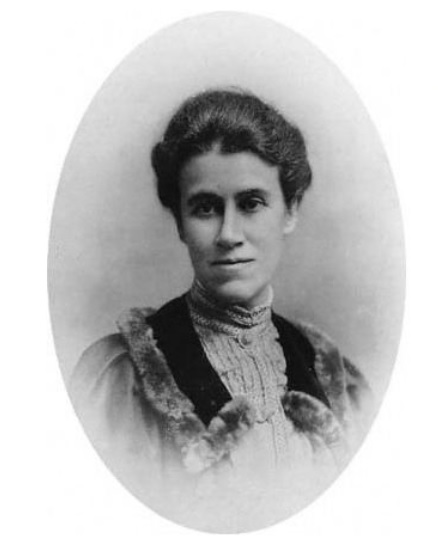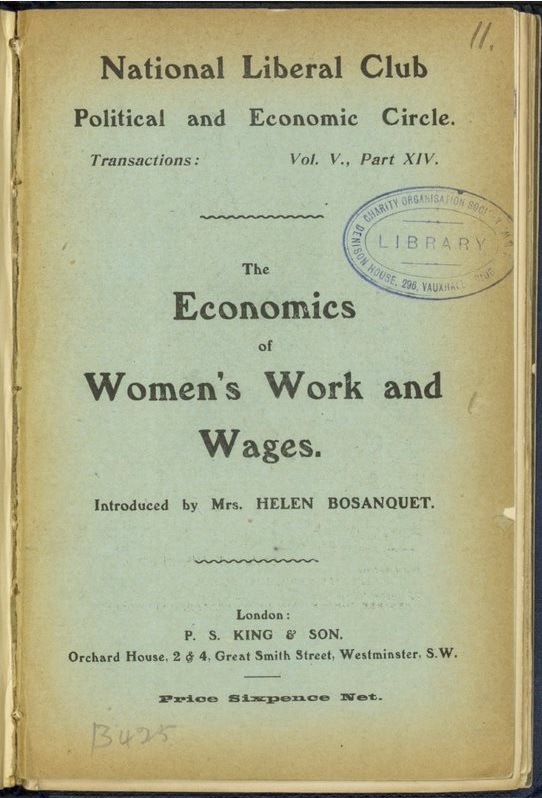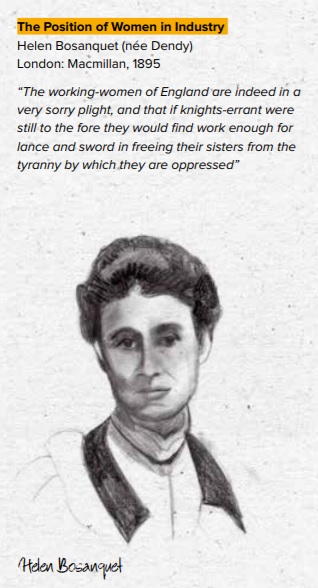 Helen Bosanquet neé Dendy (1860-1926) was
born in Manchester on 10 February 1860, the fifth child and youngest daughter in a large middle-class family. After being educated at home by a German governess, she went on to study political economy at Newham College,
Cambridge, where she gained first-class honors in the moral sciences tripos in 1889. Highly educated and ambitious, the 29-year old Helen moved to London, where she joined the most influential late nineteenth-and
early twentieth-century charitable institution, the Charity Organisation Society.
Helen Bosanquet neé Dendy (1860-1926) was
born in Manchester on 10 February 1860, the fifth child and youngest daughter in a large middle-class family. After being educated at home by a German governess, she went on to study political economy at Newham College,
Cambridge, where she gained first-class honors in the moral sciences tripos in 1889. Highly educated and ambitious, the 29-year old Helen moved to London, where she joined the most influential late nineteenth-and
early twentieth-century charitable institution, the Charity Organisation Society.
Helen Bosanquet was best known as a leader of the Charity Organisation Society as well as for her book Social Work in London 1869–1912 (published in 1914) which laid the foundations of the social work profession. Helen was active in founding a social work training programme at Bedford College and Women’s University Settlement. A well-informed commentator on family and working-class poverty, she was outspoken about the burdens that disenfranchisement placed on poor working women, as the books on display in Rights of Women: London's Pioneers in their Own Wordsexhibition at Senate House Library demonstrate. Helen Bosanquet (and Beatrice Webb – also featured in our current exhibition) was a major influence on the Poor Law Report, 1909.
 The origins of the Charity Organisation Society
The origins of the Charity Organisation Society
The Charity Organisation Society was originally founded in 1869 as the Society for Organising Charitable Relief and Repressing Mendicity, it was later called the Charity Organisation Society (1871-1946) and then became Family Action. It was set up to organise charitable endeavour and prevent poverty. It embraced a philosophy and practice of benevolent social work designed to restore the character of the individual. The 1834 Poor Law was premised on the belief that individual moral failure was the root of destitution and that the provision of relief outside the established workhouses would only serve to demoralise the recipient in providing for himself.
The Charity Organisation Society’s female visitors examined applicants for poor relief and passed judgement on the cause of poverty and the degree to which it was the result of personal irresponsibility and misfortune. The applicants to the Poor Law were then given over to the discipline of the workhouse in the case of the ‘undeserving’, or charity in the case of the ‘helpable’. This however, did not entail leaving individuals to their fate.
Writing for justice
 In her most prominent work,
The Strength of the People (1903), Helen Bosanquet sets out her view of what it means to be a ‘truly philanthropic’ member of COS:
In her most prominent work,
The Strength of the People (1903), Helen Bosanquet sets out her view of what it means to be a ‘truly philanthropic’ member of COS:
“I have always held that poverty and pain, disease and health are evils of greatly less importance than they appear except in so far as they lead to weakness of life and character; and that true philanthropy aims at increasing strength more than at the correct and immediate relief of poverty…”
The Majority Report of the 1909 Royal Commission on the Poor Law, the first such review of the law since 1834, was also dominated by the principles of ‘true charity’ and was largely written by Helen Bosanquet.
She remained a pillar of COS for most of her life. She was instrumental in defining the syllabus of the COS's school of sociology, founded in 1903, which was absorbed into the social science department of the London School of Economics in 1912. In 1909, she became the editor of the Charity Organisation Review.
A prolific author, Helen Bosanquet wrote a number of other significant works (list below) which are available in Senate House Library in the collection of over 5,000 books and pamphlets in the Family Welfare Association Library.
Rich and Poor (1896),
The Standard of Life and other Studies (1898),
The Family (1906)
Social work in London: a history of the Charity Organisation Society (1914)
Mura Ghosh
Research Librarian & Co-Curator of Rights for Women: London's Pioneers in their Own Words

